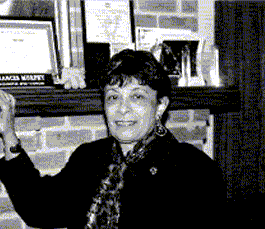Page 68
[Begin Tape 1, Side A]
Ingersoll: I'd like to talk today mostly about your teaching experience and your experience as chairman of the board of the Afro, but before we get into that, could we talk just a little bit more about your life as a mother and a wife? You said rather laughingly to me, off the tape, and too modestly, I think, "Of course, you realize, Fern, there were years when I wasn't doing very much; I was having babies." But at the same time, as we talked about what you were doing in those years, it seemed as though there was a lot. You told me that you did have a lot of help from a very close-knit family. You told me about how your son had your father looking after him during some difficult years.
But is there anything else you can say about what it was like during those years to be, as I understand it, working, studying, writing, and having young children?
Murphy: Looking back, you ask yourself the question, "How did you do it?" But while you're doing it, it doesn't seem like that much. I came up in a large family of five girls. My father had a huge family, four brothers and five sisters. So there were lots of cousins around, lots of people around, and I just, I guess, didn't think too much about the fact that I was working, having children. There was always my mother and dad, who were extremely helpful, very close. In fact, as a matter of habit, we talked to my mother every single day, just a matter of picking up the phone. If she didn't hear from all five of her girls, she'd call and find out what was wrong with you. It was a matter that you called her every day. With my father, of course, you waited for him to call, because he was so busy.
And then the in-laws. My first husband's sister, Iona [Collins], we called her Aunt Sis, was extremely close to the children. She had adopted a little girl, but my children were the only Wood grandchildren, which means that out of a family of four, and the only Wood blood was in my children. They were the godfathers, the godmothers to my children, and they frequently just came by the house to see what the children were doing, would come by and pick them up.
Then I had, as I say, my sisters, and wherever their children went, my children went. If somebody was going to the circus, you wouldn't think of just taking your children; you called up and said, "Who else wants to go to the circus?" So it was that kind of family relationship that made life very easy for you. If you were in school, they knew you were in school, so they'd call up and say, "What are you going to do with the children this weekend? I know you want to study. Can I take them? We're going on a picnic."
In those days, even when the children were little, they went to the Little School, which was run by my sister-in-law Iona Collins. During the summer, they went to Little Folks Camp for children from two to, I imagine, six years old. This was run by Dr. T.J. Woolridge in town. There was a big farm owned by the doctor, whose daughter, Grace "Splash" Burkett, was a schoolteacher, who during the summer collected all the children. I imagine we paid fairly well for it. She kept them most of the summer, Little Folks Camp.

